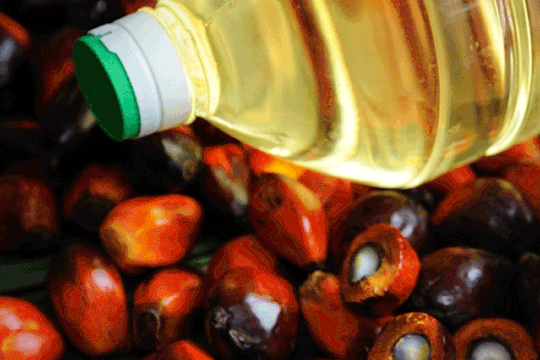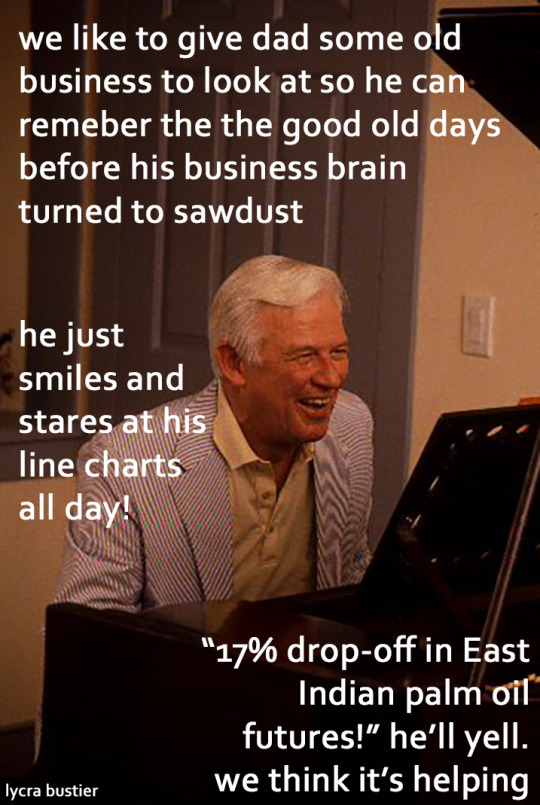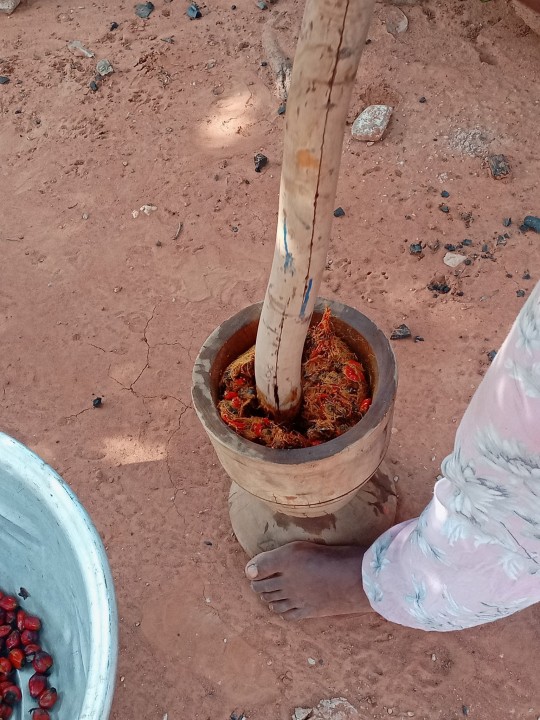#Palm oil
Explore tagged Tumblr posts
Text
Prepackaged instant noodles have their origins in the cheap price for wheat and fat (in the original case, soybean oil) dumped by the US on its East Asian protectorates, South Korea and Japan, as American aid after the Second World War and the Korean war. Since then, prepackaged instant noodles have become a staple of migrant workforces around the world. In China, the prepackaged instant noodle has become a fixture of life for the country’s poorest people and especially in the dormitories and cramped apartments of migrant workers. In this sense, it powered and continues to power the production of a huge proportion of the world’s material culture that flows outward from those factories. Nearly everything that surrounds me as I write to you emerged from or contains components built in coastal Chinese plants where palm oil-heavy instant noodles form a fixture of young migrant workers’ diets. Dozens of parts of the computer on which I type, the wax on the table on which it sits, the small plastic bottle of hand cream, the shoes I am wearing and so much more.
Max Haiven, Palm Oil: The Grease of Empire
278 notes
·
View notes
Text
A Scottish research team believe they may have produced the "holy grail" alternative to palm oil. It is estimated that almost half of all food and cosmetic products on supermarket shelves contain palm oil. The huge demand has led to significant deforestation in areas where oil palm trees can grow near the equator. Food experts at Queen Margaret University (QMU) in Edinburgh say their new 100% plant-based ingredient is 70% better for the environment. And with 80% less saturated fat and 30% fewer calories, they are also hailing PALM-ALT as a significantly healthier option. Catriona Liddle, one of the lead developers on the QMU team, said: "It's the holy grail to replace it and still have exactly the same end result in product - to taste the same and have the texture the same - and we've done that.
Continue Reading.
705 notes
·
View notes
Text

108 notes
·
View notes
Text
Indonesia Says a Half Million Acres of Palm Plantations will be Turned Back into Forests https://www.goodnewsnetwork.org/indonesia-says-a-half-million-acres-of-palm-plantations-will-be-turned-back-into-forests/
#good news#science#environmentalism#nature#environment#palm oil#palm plantations#indonesia#forests#reforestation
185 notes
·
View notes
Text
"As countries around the world begin to either propose or enforce zero-deforestation regulations, companies are coming under growing pressure to prove that their products are free of deforestation. But this is often a far from straightforward process.
Take palm oil, for instance. Its journey from plantations, most likely in Indonesia or Malaysia, to store shelves in the form of shampoo, cookies or a plethora of other goods, is a long and convoluted one. In fact, the cooking oil or cosmetics we use might contain palm oil processed in several different mills, which in turn may have bought the raw palm fruit from several of the many thousands of plantations. For companies that use palm oil in their products, tracing and tracking its origins through these obscure supply chains is a tough task. Often it requires going all the way back to the plot level and checking for deforestation. However, these plots are scattered over vast areas across potentially millions of locations, with data being in various states of digitization and completeness...
Palmoil.io, a web-based monitoring platform that Bottrill launched, is attempting to help palm oil companies get around this hurdle. Its PlotCheck tool allows companies to upload plot boundaries and check for deforestation without any of the data being stored in their system. In the absence of an extensive global map of oil palm plots, the tool was developed to enable companies to prove compliance with regulations without having to publicly disclose detailed data on their plots. PlotCheck now spans 13 countries including Indonesia and Malaysia, and aims to include more in the coming months.
Palm oil production is a major driver of deforestation in Indonesia and Malaysia, although deforestation rates linked to it have declined in recent years. While efforts to trace illegally sourced palm oil have ramped up in recent years, tracing it back to the source continues to be a challenge owing to the complex supply chains involved.
Recent regulatory proposals have, however, made it imperative for companies to find a way to prove that their products are free of deforestation. Last June, the European Union passed legislation that prohibits companies from sourcing products, including palm oil, from land deforested after 2020. A similar law putting the onus on businesses to prove that their commodities weren’t produced on deforested land is also under discussion in the U.K. In the U.S., the U.S. Forest Bill aims to work toward a similar goal, while states like New York are also discussing legislation to discourage products produced on deforested land from being circulated in the markets there...
PlotCheck, which is now in its beta testing phase, allows users to input the plot data in the form of a shape file. Companies can get this data from palm oil producers. The plot data is then checked and analyzed with the aid of publicly available deforestation data, such as RADD (Radar for Detecting Deforestation) alerts that are based on data from the Sentinel-1 satellite network and from NASA’s Landsat satellites. The tool also uses data available on annual tree cover loss and greenhouse gas emission from plantations.
Following the analysis, the tool displays an interactive online map that indicates where deforestation has occurred within the plot boundaries. It also shows details on historical deforestation in the plot as well as data on nearby mills. If deforestation is detected, users have the option of requesting the team to cross-check the data and determine if it was indeed caused by oil palm cultivation, and not logging for artisanal mining or growing other crops. “You could then follow up with your supplier and say there is a potential red flag,” Bottrill said.
As he waits to receive feedback from users, Bottrill said he’s trying to determine how to better integrate PlotCheck into the workflow of companies that might use the tool. “How can we take this information, verify it quickly and turn it into a due diligence statement?” he said. “The output is going to be a statement, which companies can submit to authorities to prove that their shipment is deforestation-free.” ...
Will PlotCheck work seamlessly? That’s something Bottrill said he’s cautiously optimistic about. He said he’s aware of the potential challenges with regard to data security and privacy. However, he said, given how zero-deforestation legislation like that in the EU are unprecedented in their scope, companies will need to sit up and take action to monitor deforestation linked to their products.
“My perspective is we should use the great information produced by universities, research institutes, watchdog groups and other entities. Plus, open-source code allows us to do things quickly and pretty inexpensively,” he said. “So I am positive that it can be done.”"
-via Mongabay, January 26, 2024
--
Note: I know it's not "stop having palm oil plantations." (A plan I'm in support of...monocrop plantations are always bad, and if palm oil production continues, it would be much better to produce it using sustainable agroforestry techniques.)
However, this is seriously a potentially huge step/tool. Since the EU's deforestation regulations passed, along with other whole-supply-chain regulations, people have been really worried about how the heck we're going to enforce them. This is the sort of tool we need/need the industry to have to have a chance of genuinely making those regulations actually work. Which, if it does work, it could be huge.
It's also a great model for how to build supply chain monitoring for other supply chain regulations, like the EU's recent ban on companies destroying unsold clothes.
#deforestation#palm oil#indonesia#malaysia#agriculture#european union#united states#save the forest#open source#technology#mapping#forestry#satellite#good news#hope#climate solutions#environment
122 notes
·
View notes
Text

Vegan with what?
#veganmeme#vegan meme#veganhumor#vegan humor#veganmemes#vegan memes#vegan#veganism#ethical veganism#palmoilfree#palm oil#deforestation#rainforest#orangutan#climate and environment#vegan living#veganproduct#vegan products#veganfood#vegan food#ethical living#govegan#go vegan#plantbased#plant based
11 notes
·
View notes
Text

Vegan Palaver Sauce (Ghanaian Spinach and Tomato Stew) with Melon Seed ‘Dumplings’, Boiled Plantains, and Avocado
#vegan#lunch#dinner#Ghanaian cuisine#west african cuisine#stews#palaver sauce#spinach#tomatoes#ginger#garlic#chili#onion#tomato sauce#egusi#melon seeds#plantains#avocado#palm oil#sea salt
19 notes
·
View notes
Text

To those who say there’s no connection between West Africa and ancient Egypt you may want to revise such notions.
The oil palm (Elaeis guineensis) is a native of West Africa. It flourishes in the humid tropics in groves of varying density, mainly in the coastal belt between 10 degrees north latitude and 10 degrees south latitude. It is also found up to 20 degrees south latitude in Central and East Africa and Madagascar in isolated localities with a suitable rainfall. It grows on relatively open ground and, therefore, originally spread along the banks of rivers and later on land cleared by humans for long-fallow cultivation (Hartley 1988: 5–7).

The palm fruit develops in dense bunches weighing 10 kilograms (kg) or more and containing more than a thousand individual fruits similar in size to a small plum. Palm oil is obtained from the flesh of the fruit and probably formed part of the food supply of the indigenous populations long before recorded history. It may also have been traded overland, since archaeological evidence indicates that palm oil was most likely available in ancient Egypt. The excavation of an early tomb at Abydos, dated to 3000 B.C., yielded “a mass of several Kilograms still in the shape of the vessel which contained it” (Friedel 1897).
A sample of the tomb material was submitted to careful chemical analysis and found to consist mainly of palmitic acid, glycerol in the combined and free state, and a mixture of azelaic and pimelic acids. The latter compounds are normal oxidation products of fatty acids, and the analyst concluded that the original material was probably palm oil, partly hydrolyzed and oxidized during its long storage.


#african#afrakan#kemetic dreams#africans#brownskin#afrakans#brown skin#african culture#afrakan spirituality#vodun#voodoo#palm oil#egyptian#egyptian art#egyptian gods#egyptian history#egyptian mythology#egyptian hieroglyphs#egyptology#archaeology#ancient#ancient egypt#kemet#ancient kemet#kemetic paganism#kemetic#kemetism#sons of kemet#kemeticism#bastet
28 notes
·
View notes
Text

if you go by business, pop-pop gets a spreadsheet?
#business#businesscore#business memes#office space#nostalgia#memes#vaporwave#retro#80s aesthetic#pianos#businessman#alzheimers#business brain#palm oil#old age#memory care
12 notes
·
View notes
Text
When the colonized world in Asia and Africa acquired independence between 1945 and 1960, Socfin managed to survive without taking a major hit.
But decolonization didn’t mean the end of foreign control of Indigenous land in the developing world; it just changed its shape.
Although many plantations in former colonies were expropriated and nationalized in the 1950s and ‘60s, soon afterwards, due to the legacy of decades of colonial rule and the subsequent lack of local expertise and capital needed to meet the requirements of the World Bank’s economic incentive programs, the newly independent governments drew on foreign capital to keep the businesses and exports running.
#palm oil#colonialism#imperialism#france#europe#capitalism#indonesia#belgium#climate and environment#racism
15 notes
·
View notes
Text
In her fascinating study of the dense networks of entanglement, contradiction, and conflict in Indonesia’s forests, many of which are today being razed for palm oil plantations, anthropologist Anna Tsing encourages us to recognize that capitalism advances through the friction between its universal logic of accumulation and the particular cultures, lifeways, and structures of power in each locale. Contrary to the dreams of a “friction-free” capitalism promised by billionaire, philanthropist, and self-styled intellectual Bill Gates, capitalism is defined by conflict and tension. Gates is only the latest of a long line of capitalist thinkers to dream that the free market, if allowed to flourish without regulation, will create a smooth world where the hardworking and talented, no matter their origins or station in life, could compete to succeed, and that this competitive striving would have beneficial effects for global society at large: greater wealth and greater innovation. Even many critics of capitalism fall prey to the myth of frictionlessness in their attempts to explain the nefarious clockwork of this demonic machine that metabolizes people and the earth not only into profit, but into the energy that fuels system’s endless reproduction and expansion. Tsing’s insistence that we look to the friction encourages us to recognize that what moves this machine forward (and halts its “progress”) is the friction that stems from forms of complicity and resistance, acquiescence and refusal that define every point where the abstract system of capitalism encounters the material realities of the entangled earth and its people.
Max Haiven, Palm Oil: The Grease of Empire
79 notes
·
View notes
Text
EU: Include Civil Society in Anti-Deforestation Task Force

(Brussels, May 31, 2024) – The European Commission should include independent civil society groups in ongoing key talks with Malaysia and Indonesia over its anti-deforestation rules, a delegation of Indigenous, human rights, and environmental organizations said today.
In June 2023, the two Southeast Asian countries formed a task force with the European Commission to resolve tensions over the implementation of a vital new European Union law to tackle global deforestation. But frontline organizations representing the rights of communities affected by deforestation have largely been left out of the task force meetings.
“We are hopeful that the EU deforestation law will support us to advance human and environmental rights locally, especially as policies to safeguard these rights are still lacking for us,” said Celine Lim, managing director of SAVE Rivers, an Indigenous organization from Sarawak, Malaysia
The delegation, which is meeting with EU officials in Brussels through May 31, 2024, consists of members from SAVE Rivers, RimbaWatch, Bruno Manser Fonds, KERUAN, and Human Rights Watch.
The European Union Deforestation-free Products Regulation (EUDR), adopted in May 2023, restricts the sale of certain products on the EU market if they are linked to deforestation or violations of land rights or human rights. Malaysia and Indonesia are the world’s biggest producers of palm oil and significant exporters of timber to the EU. The regulation covers both commodities.
The joint task force convened in Jakarta in August 2023 and again in Brussels in February 2024, with another meeting set for Brussels in September. The task force needs to hear from frontline communities most affected by deforestation and environmental organizations in their countries to genuinely understand the impact of the palm oil and timber industries, the delegation said.
3 notes
·
View notes
Text

2 notes
·
View notes
Text
16 notes
·
View notes
Text
Palm oil season.



20 notes
·
View notes
Text

Palm oil trees in Negeri Sembilan, Malaysia
Nazarizal Mohammad
3 notes
·
View notes